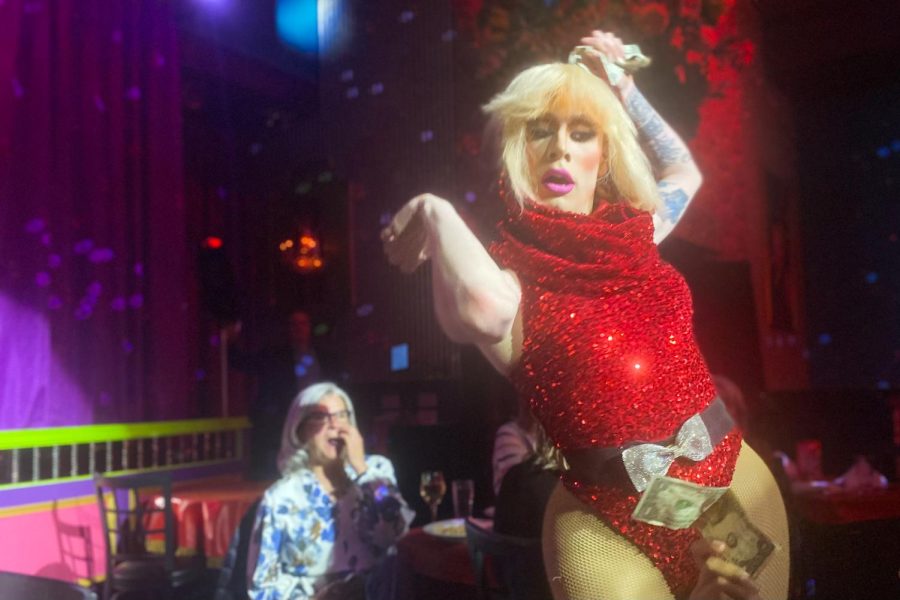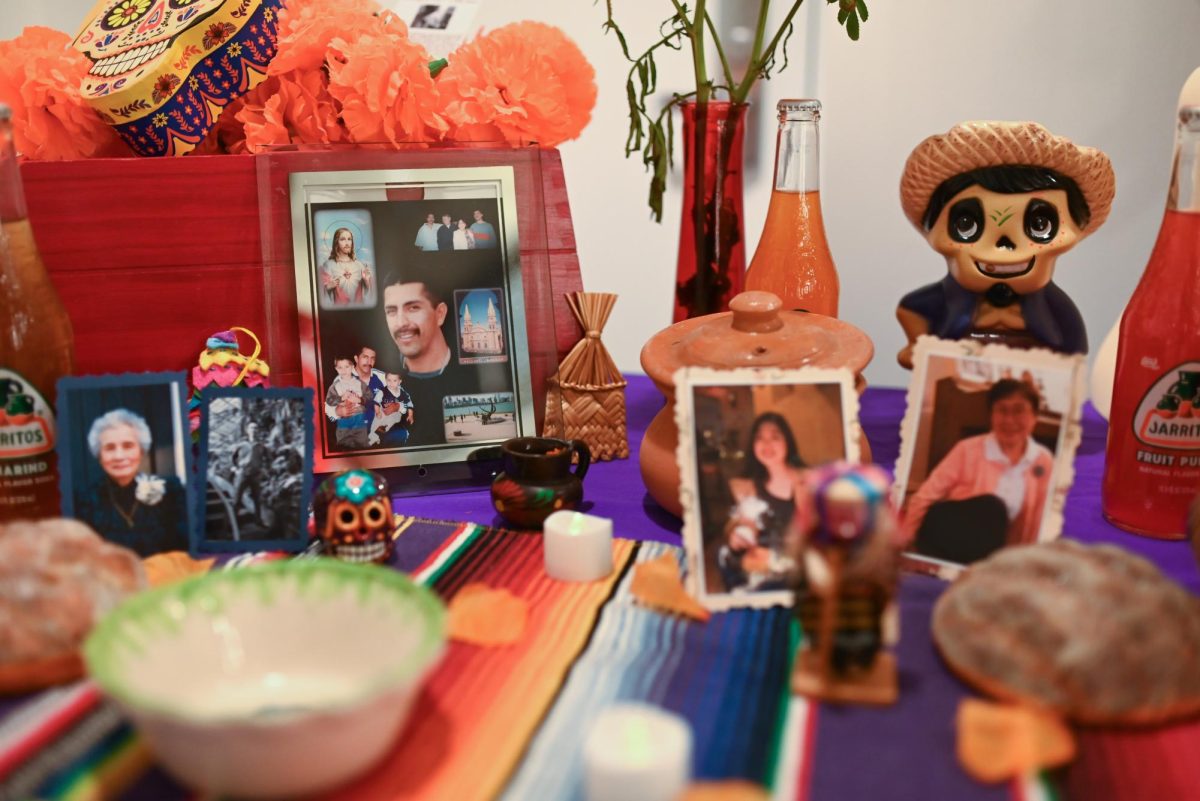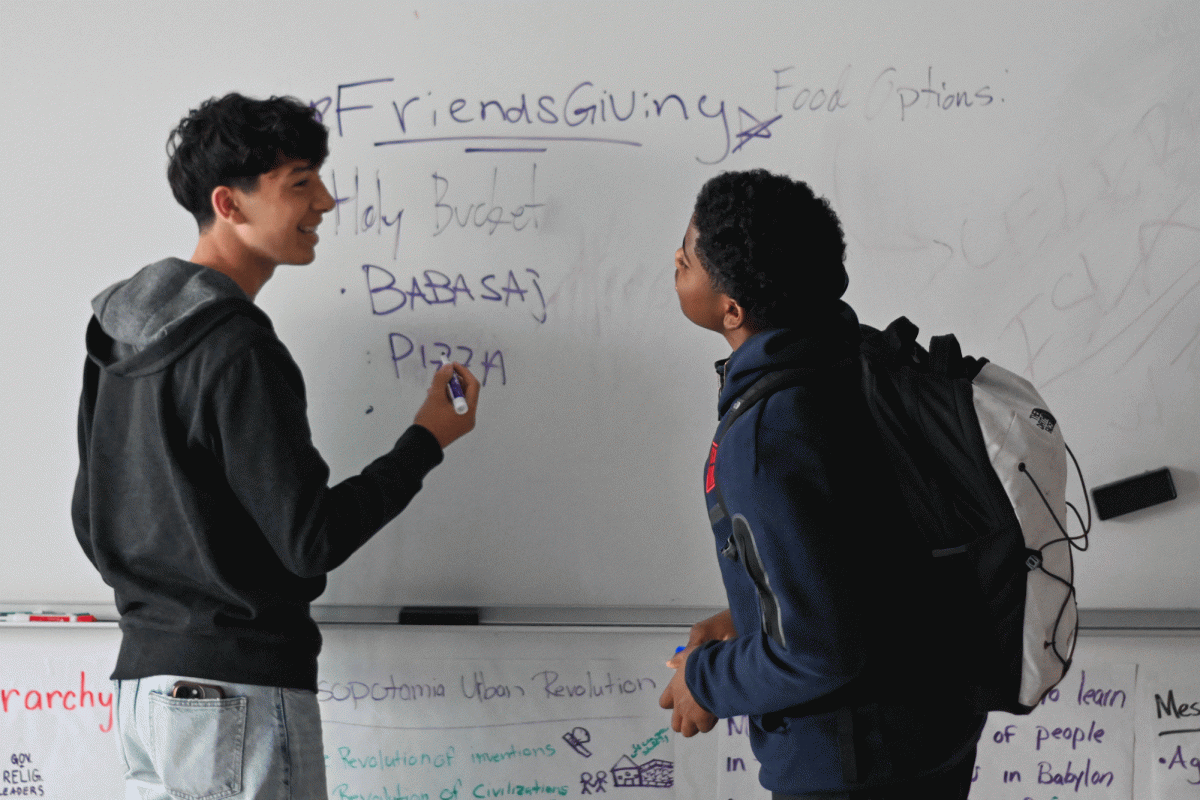Dazzling drag city
Despite nationwide legislative threats to shows, Chicago drag queens thrive
At Lips Chicago on May 19, during a drag show and dinner, drag performer Priscilla Rock dances amid flashing, colorful lights as viewers offer cash.
June 1, 2023
Loud music. Flashing lights. Glitter on nearly every surface. The roar of the crowd. Eye-catching outfits. Dollar bills strewn across the floor. It’s an environment of excitement, dancing and self-expression, yet a new Alabama bill categorizes it as “obscene material to minors” and a “public nuisance.”
While politicians across the United States desperately try to ban drag, Chicago drag performances persist and flourish, widely enjoyed and appreciated by people of all ages and identities. Not only do they provide a good time, but an environment in which audience members and performers alike can be unabashedly themselves.
Within the recent flood of anti-LGBTQ+ legislation, at least 15 states — particularly Florida, Texas and Tennessee — have focused on banning drag shows from public spaces, with vague bills written that potentially criminalize gender expression in general for LGBTQ+ people. Tennessee’s anti-drag bill states that those found in violation of the law for the first-time face misdemeanor charges punishable by a fine up to $2,500 or up to a year in jail. Subsequent violations would be felony charges.
According to drag performer Sofonda Booz, who has been performing in drag since 2015, the forward thinking in Chicago has insulated the city from much of the anti-drag movement. Sofonda said that while there is room for improvement, the LGBTQ+ community is lucky to have such safety in the city.
“I think Chicago was really at the forefront of being a safe space for gender expression in drag — long before a lot of these topics became national issues,” Sofonda said. “It was just something that I think people in Chicago were sensitive to.”
Drag queen Holly Hazmat similarly described Chicago as a “safe haven” for drag entertainers, but the widespread audience they reach on social media still opens them up to hate from those outside of the city. Holly recounted one instance where — shortly before they were supposed to headline a Pride event — a photo of them in a revealing outfit was posted on the far-right Twitter account Libs of TikTok. The image was reshared by U.S. Rep. Marjorie Taylor Greene of Georgia, who added: “This should be illegal.”
Although the subsequent flood of accusations and threats prompted Holly to turn off their social media notifications for the following two weeks, they still performed at the Pride event — albeit with an increase in security.
“That’s a perfect example of how social media can take one thing and turn a mountain out of a molehill,” Holly said. “Of course, I did not wear that scandalous outfit to an event where I knew children were going to be, but of course, all of these people, they only took what they saw and went with it. And it’s unfortunate that we have people with authority and such high power that are able to mold things on social media and on the news to their benefit.”
Having grown up in the Chicago suburbs, drag queen Aurora Divine said a much more negative attitude toward drag remains in areas just outside the city. She attributed much of this to social media, including threats a library received after booking her to host childrens’ bingo.
“I haven’t really had any hate or pushback in Chicago, but in the suburbs there definitely is,” Aurora said. “Some suburbs are great, they’re welcoming, and then there are some suburbs like Downers Grove, where they threatened the library because of everything that’s going on with social media. They were sending hate mail, they actually sent an envelope with a bullet in it to the library. So there was that.”
To help ensure the safety of drag queens across the United States, Holly said the most important thing is to vote.
“The number one thing is always go out and vote because even though it seems like your voice may not matter because you’re just one vote in a billion, it really does matter,” they said. “The more numbers that we get, the more votes that we get, the better an outcome will end up being. And, raise your voice.”
Additionally, Sofonda recommended supporting organizations like the American Civil Liberties Union and individual drag queens themselves.
“So it’s just a matter of continuing to be supportive, be loud, you know, and do whatever you can just because just because you’re not down in Tennessee, doesn’t mean there’s not something you could do,” Sofonda said. “Every little bit could possibly help.”
Shavonna Brooks, who has been performing in drag for 23 years, said drag queens across the country are not going to stop fighting against the legislation threatening their very livelihoods.
“This is Chicago — we’re not having it, there’s too many of us,” Shavonna said. “United we stand, divided we fall and every community, we’re gonna stand with each other and you’re not gonna wipe us out or stop us from doing what we’ve been doing.”












